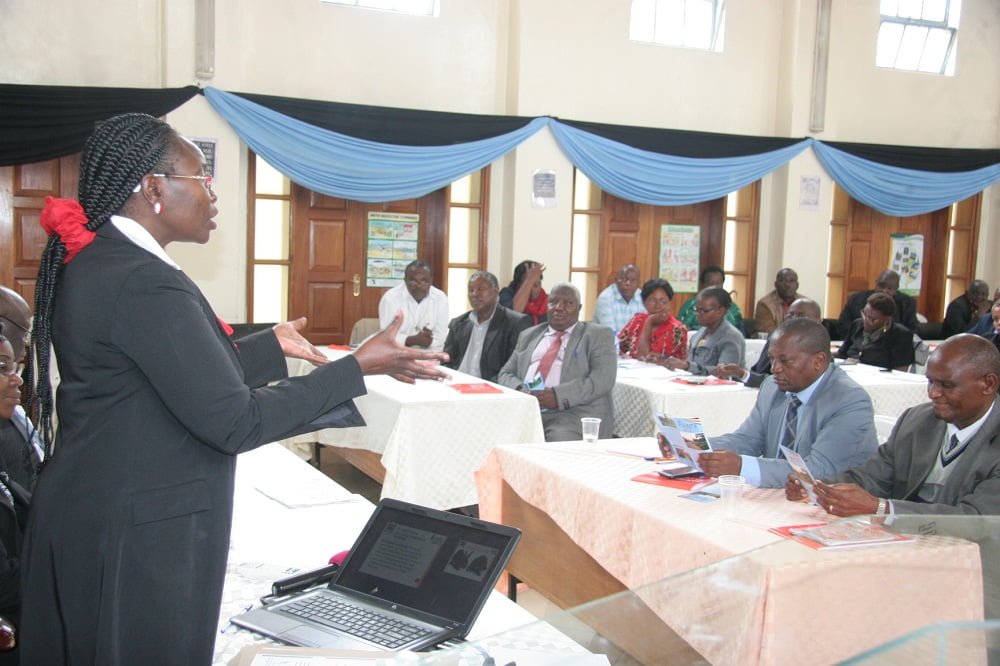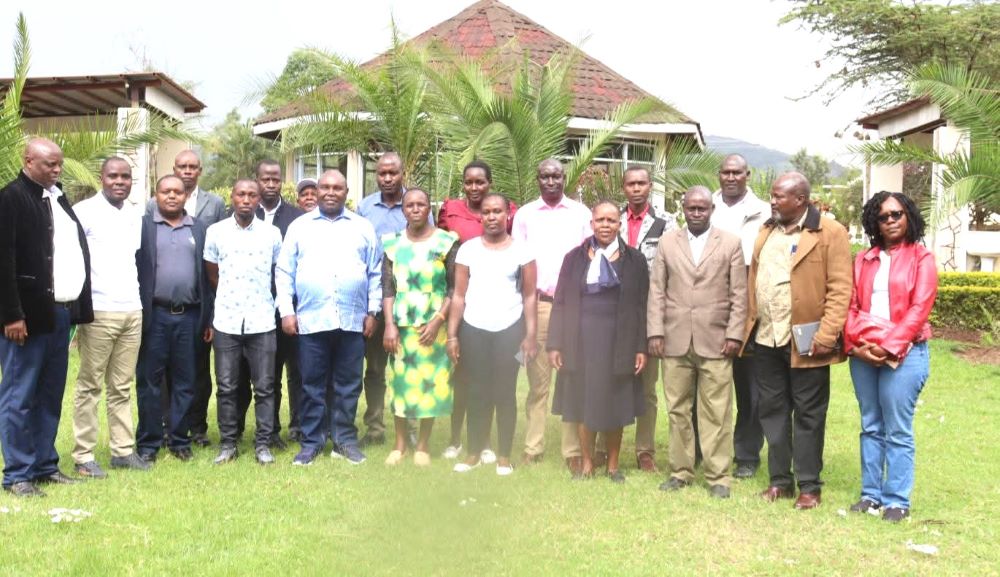(Sponsored content)
By Tindi Kuchio
The Kenya Education Management Institute (KEMI) has embarked on an ambitious process of reclaiming its position as the leading capacity building hub and the destination of choice for educators in Kenya and beyond.
Speaking to Education News in his office in Nairobi recently, KEMI Acting Director, Dr. Maurice Odondo said the institute had developed relevant programmes which are meant to address the contemporary leadership and management challenges confronting educators in the country.
He confirmed that the institute had reviewed its capacity building programmes such as –Diploma in Education Leadership and Management, Instructional Leadership, Institutional Leadership, Guidance and Counselling and, Transformational Leadership for head teachers and principals (education managers).
The administrator added that the institute had also invested its time in delivering quality training on Financial Management to school bursars and accounts clerks.
“The driving force behind KEMI’s transformation is to ensure that educators effectively use school resources to provide quality, inclusive, relevant teaching and learning to the Kenyan child,” stated Dr. Odondo.
To ensure discipline, the administrator said the institute would continue providing quality training to Boards of Management (BOMs) on the importance of creating the right environment in schools for curriculum implementation.
He revealed that the institute had acquired and installed state-of-the-art Information and Communications Technology (ICT) infrastructure for supporting institutional e-learning programmes.
“KEMI now boasts of a robust virtual campus which supports online learning through synchronous and asynchronous training delivery to educators and the course content has since been digitized following the outbreak of the Covid-19 pandemic” said the institute head.
He pointed out that it was because of the virtual campus that the capacity building centre was able to reach out to over 40, 000 educators during the lockdown period.
Dr. Odondo disclosed that the institute had also leveraged on partnerships with development partners such as UNESCO, World Bank, Education Trust, Cheshire Disabilities Ltd, DIGNITAS, Teachers Associations, Food for the Hungry, World Food Programme in developing and strengthening capacities of educators in leadership and management.
He confirmed that KEMI had partnered with the Teachers Service Commission (TSC) on provision of Teacher Proficiency Development (TPD) course to teachers in the country.
“Our TPD course is intensive because it takes into consideration Competency Based Curriculum. TDP focuses on instructional leadership and teacher pedagogy,” explained Dr. Odondo.
He revealed that teachers who register for TPD course would be expected to attend training for 15 days (five days per holiday) adding that after the actual training, learning and learner support would continue through the learning management system.
While noting that participants in TPD training had been organized into counter clusters, Dr. Odondo disclosed that the introductory module of the course would take one year and targets both heads of institutions and teachers.
The administrator heaped praise on the TPD course saying it plays a critical role in the professionalization of teaching besides enhancing understanding of competency gaps among teachers and increasing visibility in the education sector.
To reach out to targeted groups to apply for TPD training, KEMI uses face-to-face mobilization, online sensitization via virtual meetings and advertisements such as televisions fliers and posters.
It also uses partners in the education sector such as Kenya Primary Schools Headteachers Association (KEPSHA), Kenya Secondary Schools Heads Association (KESSHA), Kenya National Union of Teachers (KNUT), Kenya Union of Post- Primary Education Teachers (KUPPET) and education officials.
Asked how the institute’s TPD course is different from what other accredited universities are offering, Dr. Odondo had this to say; “Our course content is based on the TSC prescribed modules and has been contextualized to school situations for relevance and application of competencies learnt.”
He pointed out that KEMI’s biggest strength lay in its familiarity with capacity building and use of adult learning methodologies.
“Our training approaches are also very interactive and emphasize on participants being actively engaged in the learning process. We also use learner centred methodologies such as inquiry based learning, discovery, case studies and questioning,” he observed.
The institute charges Ksh. 6000 for the TPD course.
Dr. Odondo revealed that the development of every training programme at KEMI begins with a Training Needs Assessment (TNA) to identify the gaps.
“Course outline is developed with content to address the gaps identified by the TNA and pertinent contemporary issues. Validation of the content is conducted with stakeholders and curriculum development experts from the Kenya Institute of Curriculum Development,” he explained.
The KEMI head noted that the training content is then develop based on the validated course outline adding that a multi-agency approach is usually adopted in order to incorporate resource persons from relevant institutions.
The administrator said the content validation is conducted with stakeholders before its compilation in the form of a module or manual which is then used for training educators.
In sourcing for internal trainers, KEMI uses advertisements and interview process before the suitable ones are selected.
External trainers apply to the institute so as to be included in the external facilitators’ data base. The institute engages them from time to time on temporary basis depending on the training programme.
KEMI was established as Kenya Education Staff Institute (KESI) in 1981, through funding under the Government of Kenya – World Bank IDA 5th Credit project. This followed a feasibility study that had been conducted in 1978. The objective of establishing the institute was to strengthen the managerial and planning capacity of various cadres of educational personnel.
KEMI’s establishment was supported by the Ndegwa Report of the Commission of Inquiry of Public Service Structure and Remuneration (1970-71) and Wamalwa Report of the Training Review Committee (1971-72).
Both reports emphasized the need to utilize in-service training for public servants to increase efficiency.
The Gachathi Report or the National Committee on Education Policies (NCOEP- 1978-79) recommended the establishment of KEMI to provide regular in-service training in education management.
Education administrators were originally trained for teaching and not necessarily for administration. The advent of ‘Kenyanization programme’ soon after independence resulted in tasking of young and relatively inexperienced teachers with the responsibilities of either heading institutions or serving as Education Officers.
KEMI was modeled along the function of the Agency for Development of Education Management (ADEM) in Tanzania that started in 1978; and National Institute for Educational Leadership and Management (Institut Aminuddin Baki- IAB) in Malaysia that started in 1979.
The institute was originally located at Kenyatta University but was later moved to the former Highridge Teachers Training College grounds in September, 2006.
The change of name from KESI to KEMI was effected after the relocation to Highridge to reflect the mandate of the institution as a Management Development Institute and to clearly distinguish it from its sister institution – Kenya Institute of Special Education (KISE).
The similarity in names tended to create a lot of confusion among education stakeholders yet the two institutions have distinct mandates.
Since its inception, KEMI has had fourteen directors as listed below;
- Leonard Arap Sawe………..April 1981-1985.
- Nathan J. Anyonje …………1985- 1985.
- J.K. F. Kenani………………1985-1986
- D. M. Mutua………………..April 1986-July 1986.
- E. N. Njoka………………….July 6 1986- 27 January 1987.
- J. Lodiaga……………………28 January 1987- 27 April 1987.
- Dr. J. M. Njagi- Rwito………28 April 1987- 31 August 1988.
- J. Lodiaga……………………1 September 1988 -30 June 2001.
- E. M. Kiugu…………………..2001- April 2003.
- J. R. Madaguda………………May 2003- September 2003.
- Bernard N. Gachanja…………October 2003- October 2007.
- Margaret Murage…………….November 2007- June 2008.
- 13. Dr. Wanjiru Kariuki………July 2008-
- Dr. Maurice Odondo………….






